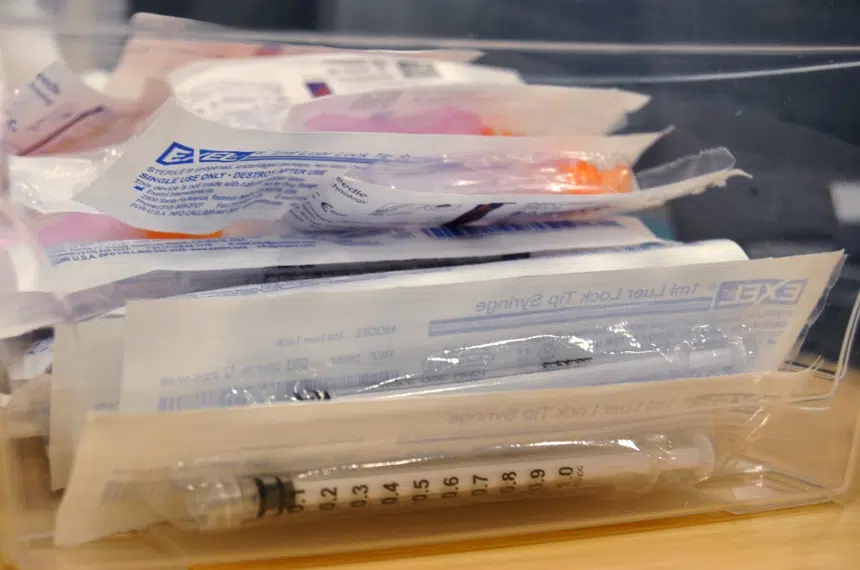According to the Saskatchewan government’s newly released timeline, every adult in the province could be eligible for a COVID-19 vaccination within about 14 weeks.
With a more sure vaccine delivery schedule from the federal government and a very large number of doses expected by the end of the month — about 124,000 — the province laid out its timeline for vaccinations Tuesday.
Premier Scott Moe said the province is expecting the first phase of vaccinations — those 70 years of age and older along with priority health-care workers — to be finished by early April. After that, the second phase can begin.
“This will be a very important milestone because it will mean everyone age 70 and above will have had their chance to get their first shot by early in April. This should significantly reduce the number of serious cases as well as hospitalizations that we’ve seen,” Moe said during a media conference Tuesday.
On April 5, people in their 60s are expected to be eligible to get a vaccination along with those in previously described groups who are a medical priority.
Two weeks later, April 19, people in their 50s are expected to become eligible for their vaccination.
As of May 10, people in their 40s are expected to become eligible. On May 31, three weeks later, the plan says people in their 30s will come eligible.
All other adults are expected to be eligible June 14. None of the vaccines currently approved for use are approved for children.
The online booking system and phone line are expected to launch soon; Moe said more information about that will be released later this week.
The 15,500 AstraZeneca vaccine doses for Saskatchewan have arrived in the province. Moe said because of the higher case numbers in Regina, all of those doses will be offered to health-care workers and people between the ages of 60 and 64 in Regina later this week.
Moe said the doses will be offered at the drive-through vaccination site at Evraz Place and will be done without appointments, on a first-come, first-served basis.
Moe once again encouraged everyone to get a vaccine as soon as they’re eligible.
“This is the most important thing that we can do to protect ourselves and to protect those around us, is to make this appointment,” said Moe.
As of Tuesday, nearly 94,000 vaccine doses have been given out in Saskatchewan. Moe said virtually all of the first doses in long-term care are finished and about 56 per cent of those have received their second dose already.
A jump in variants
Saskatchewan has been keeping an eye on cases of COVID variants of concern and on Tuesday, that counter took a big jump.
On Monday, the province was reporting nine cases — eight of the B1.1.7 variant first found in the United Kingdom and one of the B1.351 variant first found in South Africa.
On Tuesday, the province reported 44 total variant cases — 38 of the U.K. variant and six of the South African variant.
The jump is thanks to a survey of cases the provincial lab did of tests taken between Jan. 26 and Feb. 27 after it got its designation to perform the genetic sequencing.
Twenty-eight of the 35 new variant cases were in Regina.
“Part of it is that Regina has more cases but because of outbreaks and other triggers that result in focused testing for variants of concern, we’re also finding more variants of concern in Regina, but that certainly doesn’t mean that they are only in Regina,” explained Dr. Saqib Shahab, the province’s chief medical health officer.
The initial cases of the variants were linked to travel, but the province said these newly found cases indicate the variants have been spreading in the community. Shahab pointed out there were more variant cases than thought, but hospitalizations and case numbers have continued to drop in the province.
Shahab has spoken about the U.K. variant previously, saying it has been found to be more transmissible in other places it has been found.
The survey took 190 samples, about 3.2 per cent of the cases in Saskatchewan in the time of the survey. Thirty-five came back positive, which is about 18 per cent of those samples.
When asked about such a high number, Shahab explained those sample weren’t all random. Most were taken from travel-related cases, outbreaks and cases where people under 50 had to be hospitalized.
Shahab said it’s particularly important, with the light at the end of the tunnel that represents COVID vaccinations being so close, to keep the case numbers low. That way, the spread of variants will be kept low as well.
Going forward, the Roy Romanow Provincial Lab will screen all samples initially and then those that come back positive will be sent for whole genome sequencing.
“This will increase our identification of variants of concern because of more in-house capacity for both screening through SNP assay and testing for whole genome sequencing both in house and at (the national lab),” said Shahab.
Shahab said with the expanded testing, Saskatchewan will continue to see more of the variants. But it will also help Public Health track them and will help inform the public health response.
The province also announced a loosening of restrictions Tuesday, for household gatherings and worship services.
Shahab warned, though, that if he continues to see signals of concern after monitoring things like the seven-day new case average and test positivity rate — like in Regina, which has had led daily new case counts for weeks — that more steps might have to be taken, especially locally.







